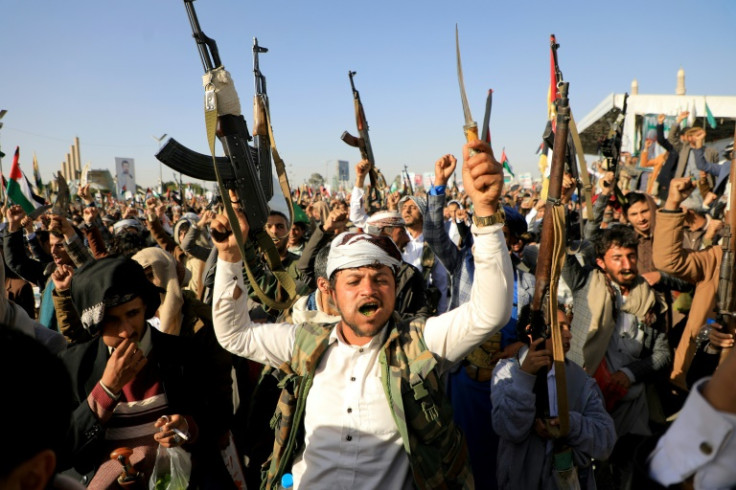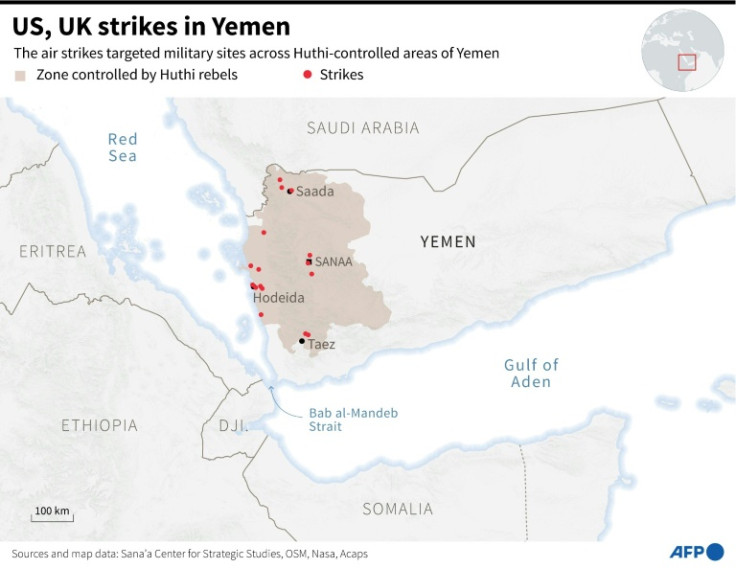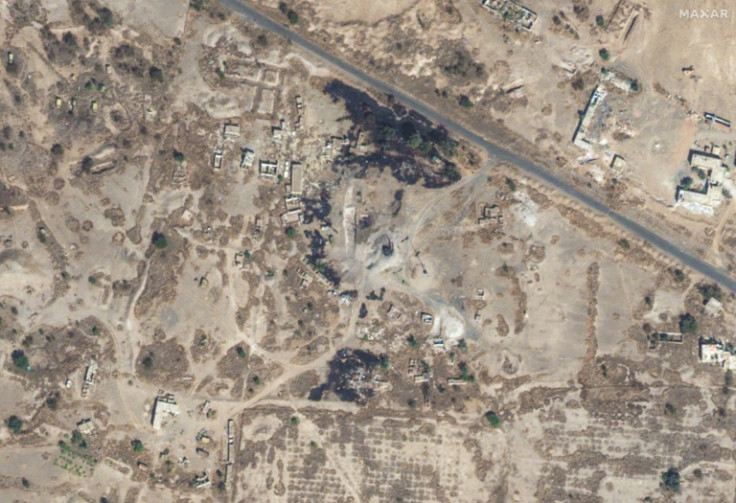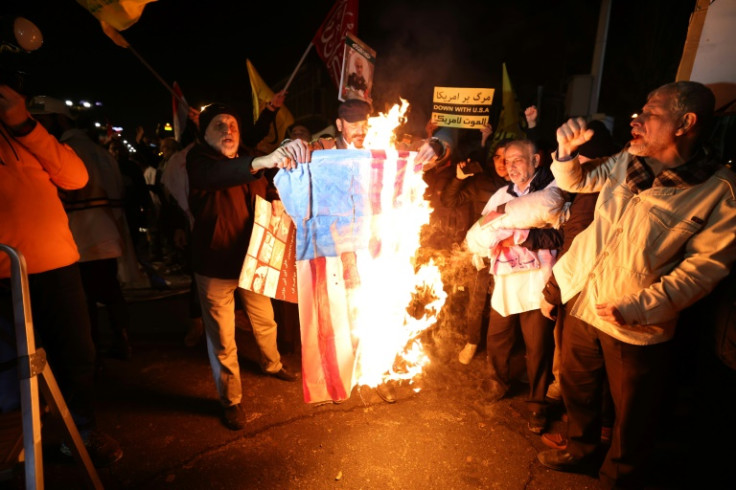New US Strike Against Yemen Rebels Over Red Sea Threat

The United States carried out a fresh strike Saturday on a Huthi rebel target in Yemen, the US military said, after the Iran-backed militants warned of further attacks on ships in the Red Sea.
The strike on a Huthi radar site came a day after US and British forces hit scores of targets across the country, heightening fears that Israel's war with Palestinian militant group Hamas could engulf the wider region.
Violence involving Iran-aligned groups in Yemen, Lebanon, Iraq and Syria has surged since the war in Gaza began in early October.
The Huthis, who say they are acting in solidarity with Gaza, have carried out a growing number of missile and drone attacks in the key Red Sea international trade route. They say they are targeting Israeli-linked shipping
Around 12 percent of global trade normally passes through the Bab al-Mandeb Strait, the Red Sea entrance between southwest Yemen and Djibouti.
But since mid-November the rebel attacks have affected trade flows when supply strains are already putting upward pressure on inflation globally.
The Huthi attacks have followed Hamas's unprecedented October 7 attack on Israel which sparked the war still raging in the besieged Gaza Strip.
US Central Command said Saturday's strike was "a follow-on action on a specific military target" related to the previous day's strikes.
The Huthis' official media earlier said Al-Dailami airbase in Yemen's rebel-held capital of Sanaa had been struck in the latest bombardment.
Britain, the United States and eight allies said strikes on Friday aimed to "de-escalate tensions", but the Huthis vowed to continue their attacks.
Analysts said the Western strikes are unlikely to stop the rebels.
They will "diminish but not end the Huthi threat to shipping," said Jon Alterman, director of the Middle East Program at the Center for Strategic and International Studies.
The Huthis withstood thousands of air raids while battling a Saudi-led coalition for more than seven years. They earlier fought six wars against Yemen's government between 2004 and 2010.
"All American-British interests have become legitimate targets" following the strikes, the rebels' Supreme Political Council said.
Hussein al-Ezzi, the Huthis' deputy foreign minister, said the United States and Britain would "have to prepare to pay a heavy price".
The rebels have controlled much of Yemen since a civil war erupted in 2014 and are part of an Iran-aligned "axis of resistance" against Israel and its allies.
UN Secretary-General Antonio Guterres called on all sides "not to escalate" in the interest of regional peace and stability, his spokesman Stephane Dujarric said.
The United Nations Security Council held an emergency meeting on the strikes Friday, days after adopting a resolution demanding the Huthis immediately stop their attacks on ships.
At the meeting, US Ambassador Linda Thomas-Greenfield warned that no ship was safe from the Huthi threat in the Red Sea.
Russian Ambassador Vassili Nebenzia denounced the "blatant armed aggression" against the entire population of the country.
Washington last month announced a maritime security initiative, Operation Prosperity Guardian, to protect maritime traffic in the area but the Huthis kept up attacks despite several warnings.
With the strikes on Friday, the United States and Britain targeted nearly 30 locations using more than 150 munitions, US General Douglas Sims said, updating earlier figures.
President Joe Biden said he did not believe there were civilian casualties.
Huthi military spokesman Yahya Saree said the raids "led to the deaths of five martyrs" and wounded six rebels.
Biden called the strikes a successful "defensive action" after the "unprecedented" Red Sea attacks and said he would act again if the Huthis continued their "outrageous behaviour".
British Prime Minister Rishi Sunak said the Huthis' breach of international law warranted the "strong signal", which he described as "proportionate".
But Nasser Kanani, spokesman for Iran's foreign ministry, said the Western strikes would fuel "insecurity and instability in the region" while "diverting" attention from Gaza.
The Huthis fired "at least one" anti-ship ballistic missile in retaliation on Friday but it caused no damage, according to Sims.
Washington said it did not seek conflict with Iran, and National Security Council spokesman John Kirby told MSNBC there was "no reason" for an escalation.
Middle Eastern leaders voiced concern, with Turkish President Recep Tayyip Erdogan describing the strikes on Yemen as disproportionate and saying: "It is as if they aspire to turn the Red Sea into a bloodbath."
Saudi Arabia said it "is following with great concern the military operations" and called for "self-restraint and avoiding escalation".
The kingdom is trying to extricate itself from its nine-year war with the Huthis, though fighting has largely been on hold since a truce in early 2022.
Hamas said it would hold Britain and the United States "responsible for the repercussions on regional security".
However, Fabian Hinz, a research fellow at the International Institute for Strategic Studies, discounted the risk of escalation, "as big players like Iran are keen on avoiding a regional war."
Oil prices rose four percent Friday on fears of an escalation before falling back.
Denmark's Torm on Friday became the latest tanker firm to halt transit through the Red Sea.
Dryad Global, a maritime security risk group, advised its clients to suspend Red Sea operations for 72 hours, citing the threat of Huthi retaliation.
Hundreds of thousands of people, some carrying Kalashnikov assault rifles, gathered in Yemen's capital Sanaa on Friday to protest, many waving Yemeni and Palestinian flags, an AFP journalist reported.
"Death to America, death to Israel," they chanted.
In Gaza City, some Palestinians lauded Huthi support and condemned Britain and the United States.
"No one is standing with us but Yemen," said Fuad al-Ghalaini, one of hundreds of thousands of Palestinians displaced by Israel's bombardment of the besieged territory.



© Copyright AFP 2024. All rights reserved.





















